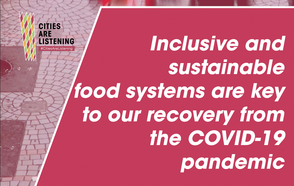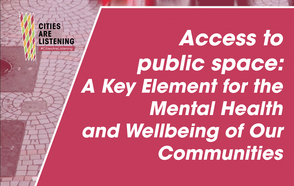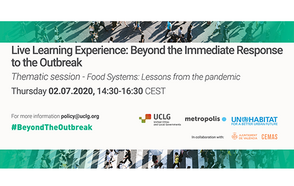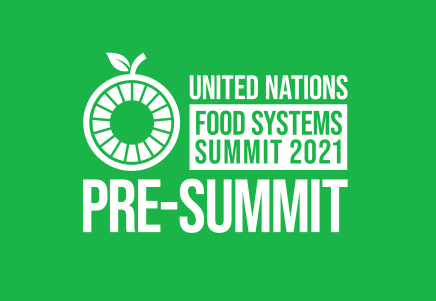
In the framework of the UN Food Systems Pre-Summit (26-28 July, 2021), the "Local public service provision and the right to food" parallel session, co-organized on 27 July, by UCLG, Barcelona World Capital of Sustainable Food 2021, Metropolis, UN-Habitat and the Women and Habitat Latin America and Caribbean Network, tackled the transformation of our models of production and consumption, and the need to root our food systems in solidarity, with care for people and the planet at the centre.
Emilia Saiz, UCLG Secretary-General, argued for the need to look at cities as more than consumers/distributors: we need to look also at the equality in the food systems, the role food plays in the ecosystem, and our journey towards sustainable means of production and consumption, as well as to universal access to sustainable, nutritious food.
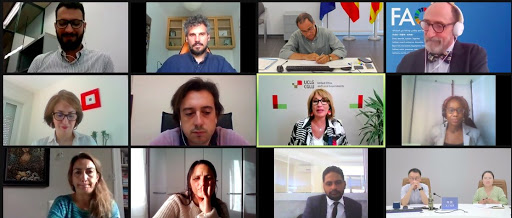 “We need to raise awareness among ourselves about the spaces we need to call for, and mature our discussions about what spaces we need to occupy. Making concrete recommendations is critical to our discussion” said Emilia Saiz, UCLG Secretary-General, when recalling that the constituency of local and regional governments needs to have a seat in the international mechanisms on food, as the Committee on Food Security. Considering the possible outcomes of the UN Food Systems Summit in September this year, she also supported an action coalition on cities, with an active and leading role for the organized constituency of local and regional governments.
“We need to raise awareness among ourselves about the spaces we need to call for, and mature our discussions about what spaces we need to occupy. Making concrete recommendations is critical to our discussion” said Emilia Saiz, UCLG Secretary-General, when recalling that the constituency of local and regional governments needs to have a seat in the international mechanisms on food, as the Committee on Food Security. Considering the possible outcomes of the UN Food Systems Summit in September this year, she also supported an action coalition on cities, with an active and leading role for the organized constituency of local and regional governments.
Álvaro Porro, Commissioner of Social Economy, Local Development and Food Policy of Barcelona, presented the policy recommendations that came out of the #CitiesAreListening Experience on urban food systems, which took place earlier this year. Food justice, he argued, was a theme that was explored in the session, and it is time to explore it further and think about food justice in the upcoming Food Summit and the COP26.
“We must succeed in giving a voice to a voice that is not represented at the UN: giving the perspective of the role that cities can play in food systems.” Álvaro Porro, Commissioner of Social Economy, Local Development and Food Policy of Barcelona
The ensuing panel discussion was facilitated by Firdaous Oussidhoum, Special Advisor to the UCLG Secretary General, and introduced representatives from cities and regions, as well as from networks of local and regional governments, the UN system and the civil society.
Abdelali El Bakkali, head of the environment and cooperation division of Chefchaouen, highlighted the efforts made in training agriculture workers on food systems and to improve the safety of agroalimentary activities, especially during the pandemic. Candaş Balta, External Relations officer of Seferihisar Municipality, and Secretary General of Cittaslow Turkey, also relaid the experience of his city regarding food systems , including the organization of a festival dedicated to exchanging seeds to ensure local-grown crops were widely available.
Constance Koukoui-Adjolohoun, Cités Unies France, argued for the need for local and regional governments to take their places at the international level to ensure a food strategy that faces the climate emergency and improves the resilience of global food systems, built on active collaboration among local stakeholders, especially for raising awareness and educating people on food systems.
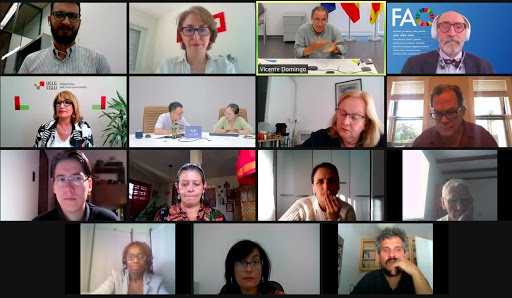 Maité Rodriguez, Women and Habitat Latin American and Caribbean Network, introduced the issue of food rights, which she claimed need to be understood as cross-cutting and include consumption, distribution, and selling food, as well as the need to consider gender equity and the need to include women in climate and resilience actions.
Maité Rodriguez, Women and Habitat Latin American and Caribbean Network, introduced the issue of food rights, which she claimed need to be understood as cross-cutting and include consumption, distribution, and selling food, as well as the need to consider gender equity and the need to include women in climate and resilience actions.
"From women's groups we raise the issue of different urban development, to fill urban gaps, and the issue of urban food systems is key. Care and women must be at the center of food systems." Maité Rodriguez, Women and Habitat Latin American and Caribbean Network.
Rafael Forero, UN-Habitat, stressed the importance of territorial approaches, and how multistakeholder collaboration is the way forward to ensure healthy food systems. Juan Carlos García y Cebolla, FAO, addressed the necessary transformations for rights-based approaches to food systems, urging national governments and all actors to rethink governance as required to secure the right to food, and how to mobilize the capacities and resources to give solutions to citizens.
Vicente Domingo, Director, World Sustainable Urban Food Centre of València (CEMAS), provided the closing remarks for the session, and argued for the need to listen to the younger generations, including children and teenagers, who are already raising awareness about the need to transform our food systems, and to tell our leaders to transform our models and develop a new order with human rights and dignity at the centre.
"The local sphere is a space that is open to and empowers creativity and identity. At a time when we have within our reach the power to feed the whole world, it is vital to resolve this imbalance.” Vicente Domingo, Director, World Sustainable Urban Food Centre of València (CEMAS).
The discussions around the UN Food Systems Summit emphasize the need for integrated approaches across a series of themes, thus converting the action agenda towards sustainable food systems as a relevant entry point to other global agendas, such as on climate change, biodiversity, gender and many others. Moving ahead, UCLG will continue to contribute to the Urban Food Systems Working and the Adhoc Working Group on Territorial Governance, as well as to support the engagement of the constituency of local and regional governments, especially with a view to the UN Food Systems Summit, September 2021, the 7th Forum of the Milan Urban Food Policy Pact (MUFPP), 19-21 October 2021, hosted by Barcelona, UN Biodiversity Conference, CBD COP 15, 11-24 October 2021: and the Glasgow Climate Change Conference, UNFCCC COP 26, 1-12 November 2021.
- Read the outcome policy recommendations stemming from the #CitiesAreListening experience on “Urban Food Systems": Nutrition and the Climate Emergency, that were presented during this parallel session.











